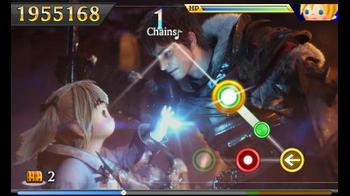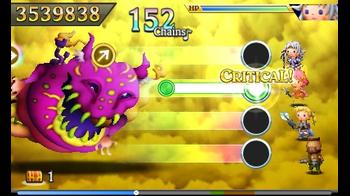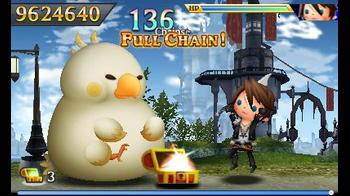Theatrhythm Final Fantasy: Curtain Call Review
When I think of Final Fantasy as a whole, one of the first things that usually comes to mind is its music. Music helps define Final Fantasy – each entry unique in its own regard with the talents of composers old and new rounding out each title in their own way. Drawn up following the success of the original, Square Enix decided to reach back into their storied archives for another go-around at its well-proven “rhythm RPG” formula – bringing fans another, more definitive version of Theatrhythm Final Fantasy to experience on the go.
Similar to the first game, Curtain Call’s gameplay relies on the touching and tapping of the stylus on the 3DS’s screen, although now players can use the system’s face buttons as inputs as well should they so desire. Being able to use buttons is a welcome change over the sometimes strenuous use of stylus – it has allowed the game to become a more relaxing and enjoyable experience even as a seasoned player.
Customization is largely at play here and Square Enix has done well to flesh out many of the existing gameplay modes while adding new challenges that go beyond a conventional rhythm game. Once again, the core of the game has been established on the quick tempo of Battle Music Stages (BMS), the more even-paced Field Music Stages (FMS), and nostalgia-driven Event Music Stages (EMS). Each type involves a number of circular icon prompts that scroll past, calling forth the musical prowess of the player to react accordingly.
Beyond basic song run-throughs, Curtain Call introduces two new modes: Quest Medley and Versus Mode. Quest Medley expands a bit more on the series’ RPG roots – letting you customize a set party of four characters and venture off through lands, taking on battle challenges along a world-map style experience. Similar to the Chaos Shrine in the original game, collecting various loot, character and song unlocks and leveling your own characters are the main motivation for going here. Quest Medleys present the player with a greater sense of purpose for playing the game outside of mastering songs on their own.
The other new mode Square Enix added in was a Versus Mode, which allows you to either play against an AI or match-make your way into head-to-head music battles with other people around the world. To break it down, each side chooses a difficulty mode and song, with a coin flip deciding which one you’ll be battling with. During the course of the song, an EX Gauge builds up points that will eventually allow certain abilities to be used against your opponent. The reward for participating and winning in this mode is one of three CollectaCards – trading card-like items – along with online ranking points.
These new modes are only the tip of the iceberg for Curtain Call, however. As with any music game the most important component is its songs and it is here the game excels the most. Piling on top a healthy serving of new tracks, Curtain Call expands its roster beyond the core thirteen mainline titles and brings in music from series sequels, spin-offs and the newly released Final Fantasy XIV: A Realm Reborn. With over 221 songs – including DLC bundled in from the previous title - the line-up is truly massive. Of course, Square Enix has planned for and is already releasing more tracks and characters online. Post-launch support for the game has certainly been impressive.
Many of these songs can be played right from the start, however. Playing through each one and accruing points called Rythmia will unlock additional ones as well as the rest of the gameplay modes as you work through the game. For those that played the original Theathyrhm, you’ll find that some songs have been mixed around to different Stage types. For example, Final Fantasy X’s “Suteki da ne” used to be an Event Music Stage, but appears here as a Field Music Stage. These changes, while curious, were an interesting idea to change things up a bit, I felt.
There’s no doubt that Theatrhythm Final Fantasy Curtain Call is a welcome improvement over its predecessor. Its pick-up and play nature coupled with new songs and gameplay modes highlight a sequel that has undoubtedly been done right. Like the original, enjoyment still relies a bit on your dedication to the Final Fantasy series, but for any fan - even an admirer of music - the game is enjoyable in its own right. Do yourself a favor and check it out.


